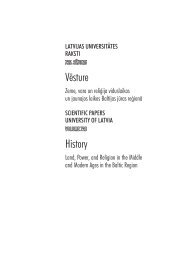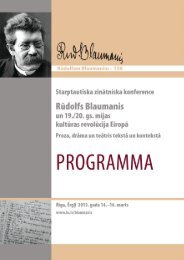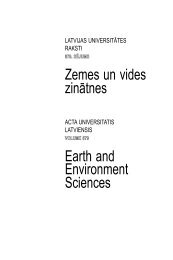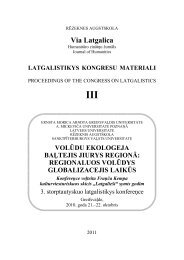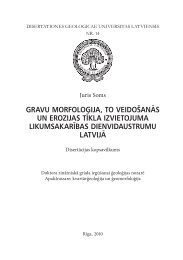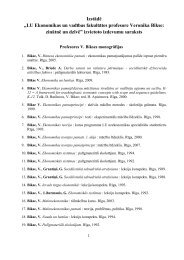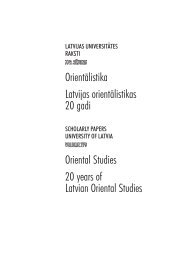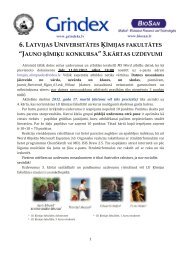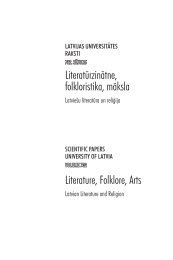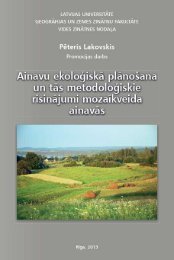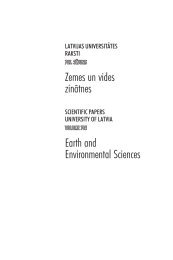Untitled
Untitled
Untitled
Create successful ePaper yourself
Turn your PDF publications into a flip-book with our unique Google optimized e-Paper software.
LATVIJAS UNIVERSITÂTES RAKSTI. 2004. 666. sçj.: LITERATÛRZINÂTNE, FOLKLORISTIKA,<br />
MÂKSLA, 59.–67. lpp.<br />
Female Identity in the Postcolonial Situation:<br />
The Case of the Ukraine<br />
(Field Research in Ukrainian Sex by Oksana Zabuzhko)<br />
Sievieðu identitâte postkoloniâlâ situâcijâ:<br />
Ukrainas gadîjums<br />
Natalia Monakhova (Ukraine)<br />
Kyiv Laboratory of Gender<br />
and PhD Program in Comparative Literature,<br />
National University of Kyiv–Mohyla Academy<br />
23/9 Khoryva str., apt. 13, Kyiv 04071 Ukraine<br />
e–mail: natalia@cvu.kiev.ua; nmonakhova@yahoo.com<br />
Using key concepts of postcolonial theory, I argue that they are applicable to the contemporary<br />
Ukrainian context and to Ukrainian literature. I prove this hypothesis by applying these<br />
concepts (in particular the notion of a subaltern) to Oksana Zabuzhko’s Field Research in<br />
Ukrainian Sex (1994), demonstrating that postcolonialism can provide both an explanation for<br />
various cultural formations in the Ukraine and a framework for interrogating and subverting<br />
them, as well as open space for female self–identification, which is to say for topics which<br />
have been traditionally marginalized and silenced.<br />
Keywords: postcolonial theory; Ukraine; female identity; national identity; autobiography.<br />
For Ukrainians, the early nineties, with the disintegration of the Soviet Union and<br />
rapid social and political changes in the Eastern bloc, were also a period of a radical<br />
reconceptualization of their national identity. What makes this a special process within<br />
Ukrainian culture, compared with other East European countries which underwent<br />
similar processes, is a strong feeling of coloniality, of a post–imperial legacy which<br />
still influences and deforms the mentality of the people. Field Research in Ukrainian<br />
Sex (1994) by Oksana Zabuzhko was a first attempt not only to reflect this feeling<br />
but to analyze it on a literary level and thus not only to turn the colonial powers<br />
against themselves but to transform them into a powerful source of the<br />
reconceptualization of Ukrainians, and in particular of Ukrainian women. In this paper,<br />
grounding my discussion in feminist postcolonial criticism and relying upon the<br />
notion of the “subaltern” proposed by G.C. Spivak in her essay “Can the Subaltern<br />
Speak?”, I will argue that the protagonist of the novel, Oksana, establishes herself as<br />
a representative of her own nation who tries to give voice to the experience of being<br />
a woman in a society disfigured by famine, purges, and a repressive colonial legacy.<br />
I will argue that re–constructing herself and her life as an embodiment of Ukrainian<br />
national identity, Oksana constructs herself as a voice coming from the margins which<br />
becomes a center of radical openness.<br />
From the very moment it was published, Field Research in Ukrainian Sex was<br />
regarded by the public as an account of one of the author’s love affairs because the<br />
novel is blatantly autobiographical. Besides, its unusual literary form which plays



